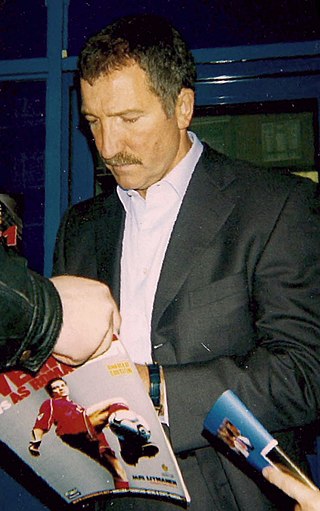Related Research Articles

Rangers Football Club is a professional football club in Glasgow, Scotland. The team competes in the Scottish Premiership, the top division of Scottish football. The club is often referred to as Glasgow Rangers, though this has never been its official name. The fourth-oldest football club in Scotland, Rangers was founded by four teenage boys as they walked through West End Park, in March 1872, where they discussed the idea of forming a football club, and played its first match against the now-defunct Callander at the Fleshers' Haugh area of Glasgow Green in May of the same year. Rangers' home ground, Ibrox Stadium, designed by stadium architect Archibald Leitch and opened in 1929, is a Category B listed building and the third-largest football stadium in Scotland. The club has always played in royal blue shirts.

Graeme James Souness is a Scottish former professional football player, manager and television pundit.

Walter Ferguson Smith was a Scottish football player, manager and director, primarily associated with his two spells as manager of Glasgow club Rangers.
Sir David Edward Murray is a Scottish entrepreneur, businessman and former chairman of the Rangers Football Club.
Fergus John McCann is a Scottish–Canadian businessman and entrepreneur.
William Waddell was a professional football player and manager. His only club in a 16-year career as a player in the outside right position was Rangers which yielded six major winner's medals, and he also played 18 times for Scotland.
Edward Henry Thompson OBE was a Scottish businessman. A well-known figure in the Scottish retail industry, he founded the convenience store chain Morning, Noon and Night in 1991, which he later sold for £30 million in 2004. He was awarded the OBE for services to the Scottish grocery industry in 2005.
Rangers Football Club, formed in 1872, is the fourth-oldest association football club in Scotland, and the first club in the world to win more than fifty national league titles. It is the second-most successful club in world football in terms of trophies won, behind Egyptian club Al Ahly.
Martin Edward Bain is a British football executive. He was formerly Chief Executive officer of Scottish club Rangers, the CEO of FSDL, the organising company of Indian Super League. He has also been the CEO of English club Sunderland A.F.C, and Maccabi Tel Aviv.
The 1988–89 season was the 109th season of competitive football by Rangers.
John Ferguson McClelland, CBE, FRSE, FRSA is a Scottish businessman and a former chairman of Rangers F.C.

The ownership of Arsenal F.C. and Arsenal W.F.C. is considerably different from that of other clubs in English football for men and women. It is owned by a parent company, Arsenal Holdings plc, which has relatively few shares which are infrequently traded. Historically, the club has been owned by descendants of the Bracewell-Smith and Hill-Wood families. The club attracted outside interest as two rival tycoons, Stan Kroenke and Alisher Usmanov, acquired significant share holdings in 2007. In August 2018, Kroenke's offer of £550 million for Usmanov's share was accepted, and Kroenke bought out the remainder of the shares to become the club's sole shareholder.
Rangers is a professional football club in Scotland founded in 1872. The club entered financial difficulties during the late 2000s, and the club entered administration in February 2012. It owed substantial amounts to HM Revenue and Customs (HMRC), who subsequently refused to allow Rangers to exit administration via a company voluntary arrangement (CVA). The Rangers Football Club plc entered liquidation on 31 October 2012.
Rangers is a Scottish football club based in Glasgow and founded in 1872. The club's corporate entity was created in 1899 when The Rangers Football Club Ltd was formed as a privately held company. In 2000, the then chairman and owner David Murray floated the club on the stock market which subsequently converted the private company into a public limited company (PLC).
Malcolm Alexander Murray is a Scottish businessman and former chairman of Rangers Football Club.
The 2013–14 season was the 134th season of competitive football by Rangers
David Cunningham King is a Scottish-born, South African based former chairman of Rangers Football Club.
Paul Murray is a Scottish businessman. He is a former director of Rangers Football Club.
Club 1872 is a supporters group for fans of the Scottish football club Rangers.
Douglas Ireland Park is a Scottish businessman. He was the chairman of Rangers Football Club before stepping down in April 2023. He is still a director of the club.
References
- ↑ Stephen Halliday, Ogilvie relishing his new challenge at Hearts, The Scotsman, 26 November 2005
- 1 2 3 Grant, Michael (9 June 2006). "20 years on...the Souness revolution". The Sunday Herald. Retrieved 1 December 2017.
- ↑ European Timber Systems Archived 2007-09-29 at the Wayback Machine website, accessed 11 May 2007
- ↑ The evolution of OSC Archived 29 September 2007 at the Wayback Machine , Building Design magazine, accessed 11 May 2007